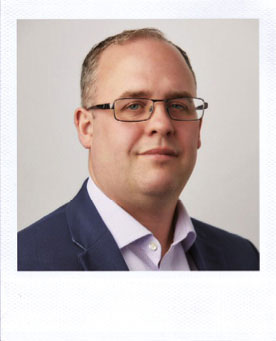A recent report from the Living Wage Foundation found 6.1 million workers experience low pay and insecure hours. The research echoes that of Working Well: Delivering Better Outcomes for Hidden Workers by L&G which found many FM related staff such as cleaners, maintenance and security staff are struggling to cope with low wages and unsociable hours. What more can the FM sector do to support these often-overlooked workers?
 ‘HIDDEN WORKERS’ PROJECT TEAM
‘HIDDEN WORKERS’ PROJECT TEAM
MEMBER’S VIEW
MARK TYSON, HEAD OF PROPERTY OPERATIONS AT LGIM REAL ASSETS
Across the UK’s real estate sector, there’s a magnitude of workers keeping our operations running, but they’re often overlooked. The pandemic has shone a spotlight on the health inequalities that exist for a vital part of the workforce. Now – with a backdrop of rising costs and higher inflation – the physical and mental wellbeing gap identified in our research will only be further exacerbated.
More than half of respondents in our hidden workers survey (Dec, 2022) worked nine hours a day, and a third of this group worked 11 hours or more a day. This had a direct impact on mental and physical health and on their relationships with partners, children, and their wider families and communities. Fear of losing pay or appearing weak or unreliable, especially in a cost-of-living crisis, prevents them from asking for time off.
However, businesses can be part of the solution and improve the social conditions that affect health and health equity: in conditions of work and employment; in goods and services; and in the impact they have on wider society and the environment.
There are, unfortunately, some misconceptions about implementing these changes. The predominant concern is that introducing basic sick pay support comes at a significant cost. L&G’s own experience however is that this adds just one to two per cent to annual contract values. The second misconception is that workers might take advantage of a more ‘generous’ system – yet we know that early diagnosis and recuperation reduces ongoing absences, and that performance management systems in the workplace are good safeguards against abuse of the system.
Across over 80 per cent of its 400+ multi-let property portfolio, L&G has already mandated that cleaning, security, landscaping etc. suppliers must drop waiting days, introduce a top up sick pay and provide access to online GP services. We are now focusing on how we encourage workers in these roles to access these services and work with their management teams to plan medical appointments and get support at the right time. This is a huge cultural shift and we don’t want to do this alone.
That is why we are working with the Centre of Progressive Change to support the Safe Sick Pay campaign which aligns with removing waiting days for statutory sick pay. This year the topic was discussed in parliament as part of PMQ’s in July with the financial impact on UK Plc identified in their report with WPI Economics.
This gives us an opportunity to work together across the real estate industry to consider how we adopt these important changes, both from a people and commercial perspective, which is mutually beneficial to the individual, supply chain partners and the organisations buying these services. Additionally, we can also go further and provide better access to healthcare services by working closely with the NHS, local government and providers of community health services.
Look out for events later this year and next in partnership with industry bodies and businesses to help share the practical information needed to implement these changes, but also push ourselves as an industry to create positive change for those working in these roles and the wider UK economy.
Ultimately, all workers should have the same access to sick pay policies and basic healthcare – this is an area we can all work closely together to close the gap we currently have.





